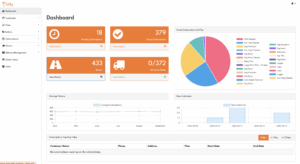Running a tiffin service in 2025 is not the same as it was a few years ago. Many business owners still rely on WhatsApp orders tiffin-style to manage daily meals and subscriptions. While WhatsApp feels simple, this approach often creates confusion, missed orders, and wasted time. If your customers depend on WhatsApp messages for placing orders, it’s only a matter of time before mistakes cost you money and customer trust. That’s why upgrading from WhatsApp to smarter digital solutions is no longer optional—it’s the key to growth.
In 2025, tiffin businesses need to think bigger. Moving from manual WhatsApp order management to smarter digital solutions is no longer optional—it’s essential for driving growth, improving efficiency, and enhancing customer satisfaction.
In this blog, we’ll explore the challenges of using WhatsApp for tiffin orders, why upgrading is a must, and the digital alternatives that can help tiffin businesses thrive.
Why WhatsApp Became Popular for Tiffin Orders
1. Familiarity and Ease of Use
Almost everyone uses WhatsApp daily, making it a natural choice for order-taking. Customers message their order, and business owners respond.
2. No Extra Costs
WhatsApp is free, so small tiffin services don’t need to invest in expensive technology upfront.
3. Instant Communication
With instant messaging, customers can confirm orders quickly, share delivery instructions, or ask questions on the spot.

The Limitations of Managing Orders on WhatsApp
While WhatsApp is convenient for individuals, it creates several challenges when scaled to dozens—or even hundreds—of customers.
1. Manual Workload
Every order needs to be checked, noted, and updated manually. This increases the chances of errors, especially during peak times.
2. Tracking Issues
There’s no centralized system for tracking orders, payments, or delivery status. This makes it hard to stay organized.
3. Missed Messages = Missed Revenue
When messages pile up, it’s easy to miss an order. One lost message could mean one unhappy customer—and potential negative word of mouth.
4. No Analytics or Insights
WhatsApp doesn’t give data on popular dishes, repeat customers, or delivery efficiency. Without insights, businesses can’t make data-driven improvements.
5. Customer Experience Challenges
Imagine a customer who needs invoices, subscription tracking, or payment history—WhatsApp can’t provide that level of service.
Why Tiffin Businesses Must Upgrade in 2025
The food delivery and subscription space has become more competitive than ever. Customers expect the same convenience from local tiffin services that they get from big apps like Swiggy, Uber Eats, or DoorDash.
1. Customers Expect Professionalism
Digital ordering systems offer receipts, confirmations, and tracking—things that build trust and professionalism.
2. Scale Without Chaos
If you want to grow from 20 orders a day to 200, WhatsApp becomes unmanageable. Smart digital tools allow smooth scaling.
3. Time = Money
Automating order-taking, payments, and delivery management saves hours of manual work daily. That’s time business owners can spend on improving food quality or customer service.
4. Competition is Going Digital
Other tiffin businesses are already upgrading. Staying behind risks losing customers to competitors offering better service.
5. Data is the New Oil
With smart software, tiffin businesses can track customer preferences, popular dishes, peak order times, and more—leading to smarter decisions and higher profits.
Smart Digital Alternatives to WhatsApp Orders
If not WhatsApp, then what? The good news: there are many solutions like Tiffy, specially designed for small food businesses and tiffin services.

1. Online Ordering Platforms
-
Customers browse menus and place orders through a website or app.
-
Automatic confirmations reduce miscommunication.
-
Payments are integrated—no need to track manually.
2. Subscription Management Tools
-
Perfect for tiffin businesses with weekly or monthly meal plans.
-
Auto-renewals, reminders, and customer dashboards simplify management.
3. Delivery & Route Optimization Software
-
Assign deliveries to drivers automatically.
-
Real-time tracking helps customers know when their meal will arrive.
-
Reduces fuel costs and improves on-time delivery.
Check out our guide on the best route optimization tools for tiffin businesses
4. Digital Payment Solutions
-
Integrating UPI, cards, or wallets makes transactions smoother.
-
Keeps a record of every payment for business transparency.
5. Customer Relationship Management (CRM)
-
Store customer data securely.
-
Send personalized offers, loyalty rewards, and follow-ups.
Case Study: A Tiffin Service That Upgraded Successfully
Let’s imagine “HealthyBox Tiffins”, a small business in Toronto, Canada. They started by taking 30–40 orders daily on WhatsApp. Initially, it was manageable. But as orders grew, they faced problems:
-
Missed customer messages
-
Delivery delays
-
Payment confusion
In 2024, they shifted to a digital ordering system with subscription management. The results were clear:
-
Order accuracy improved by 95%
-
Customer retention increased by 40%
-
Daily admin time dropped by 3 hours
Their story shows how upgrading from WhatsApp to digital tools is not just about convenience—it’s about survival and growth.
How to Transition Smoothly from WhatsApp to Digital
-
Start Small: Introduce a simple online form or ordering page alongside WhatsApp.
-
Educate Customers: Tell them why you’re upgrading (“for faster service, accurate orders, and better tracking”).
-
Offer Incentives: Discounts for customers who order through the new system.
-
Train Your Team: Make sure delivery staff and kitchen teams know how to use the new software.
-
Phase Out WhatsApp Orders Gradually: Don’t shut it down overnight—let customers adapt.
Conclusion: The Future of Tiffin Ordering in 2025
WhatsApp helped tiffin services grow in their early stages, but it wasn’t built for scaling food businesses. In 2025, customers expect more professionalism, accuracy, and convenience.
By upgrading from WhatsApp to smarter digital solutions, tiffin businesses can save time, reduce errors, and deliver a better customer experience. The shift might feel challenging at first, but it’s the key to sustainable growth in today’s competitive food industry.
Ready to take the next step? Try Tiffy today and see how simple it is to manage orders, deliveries, and subscriptions—all in one place.

